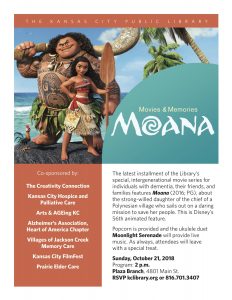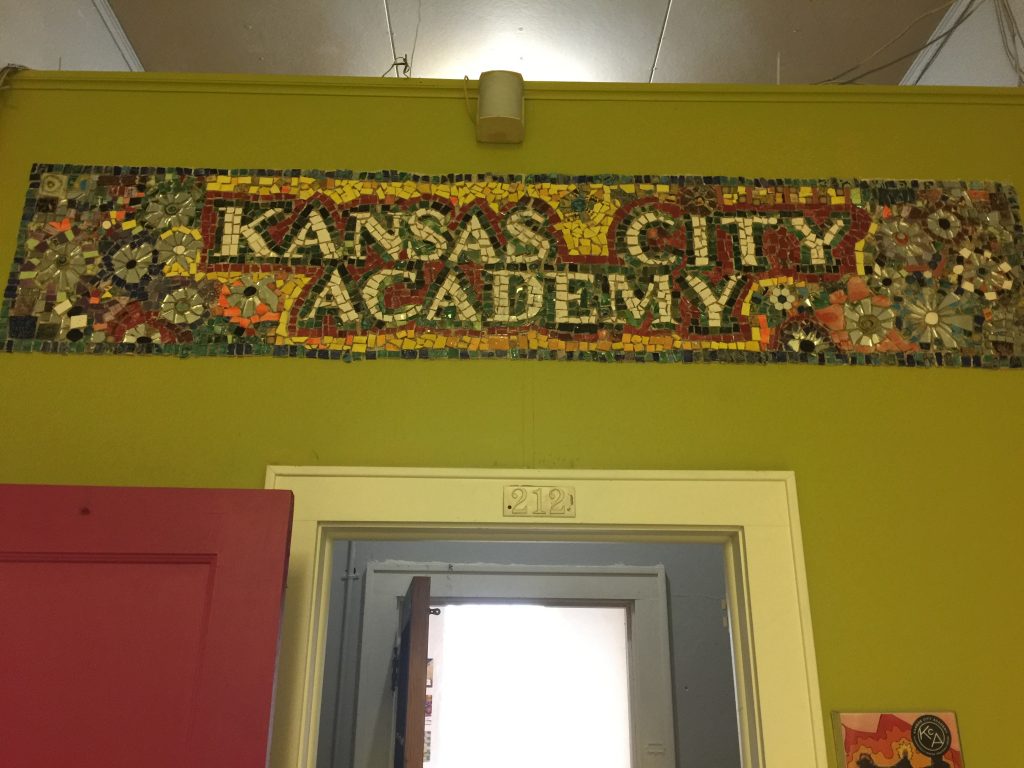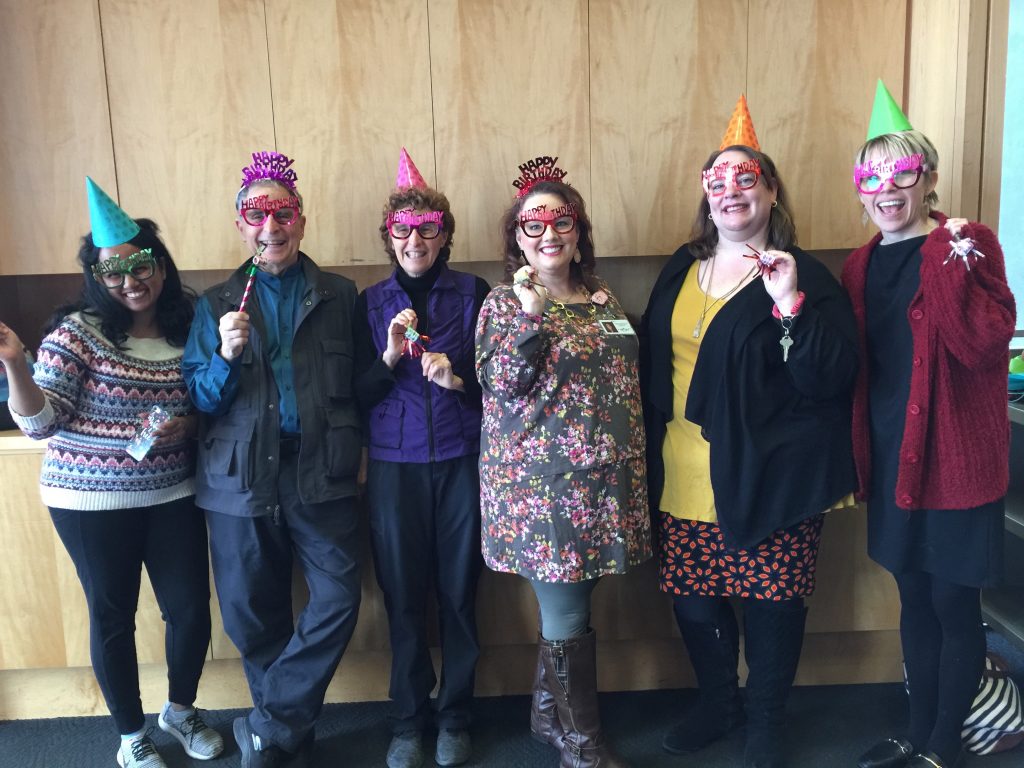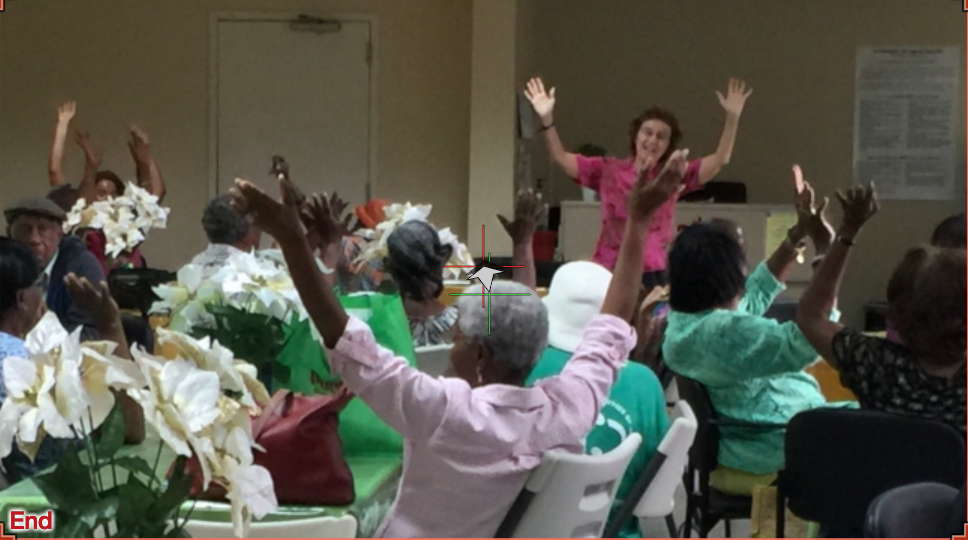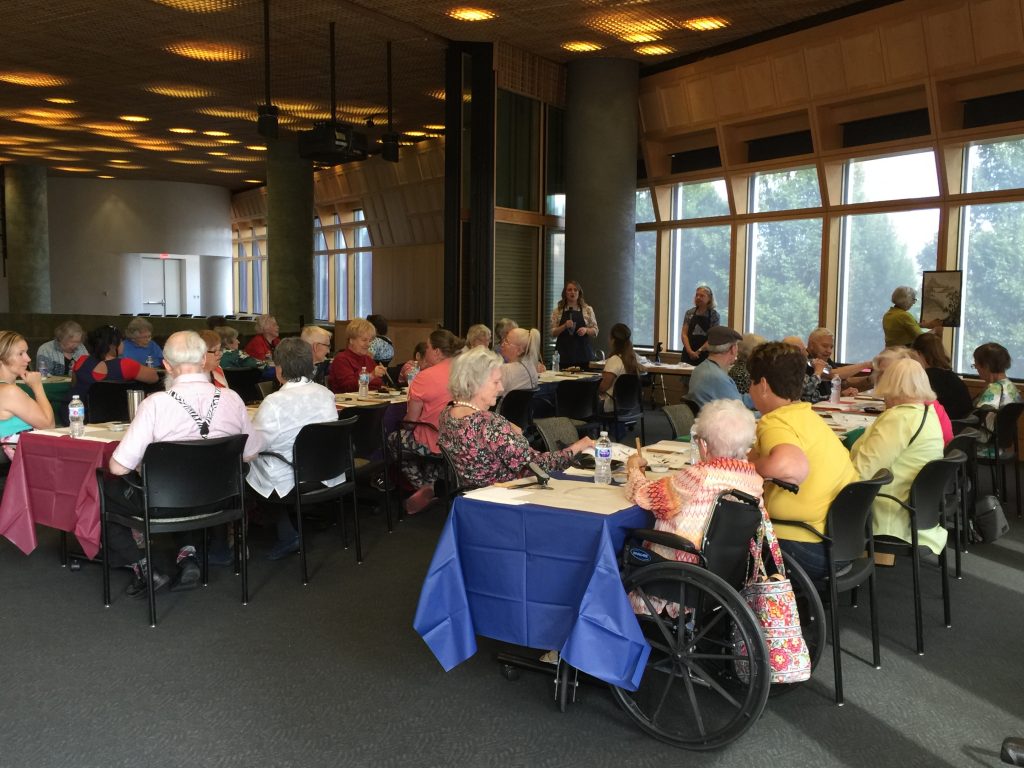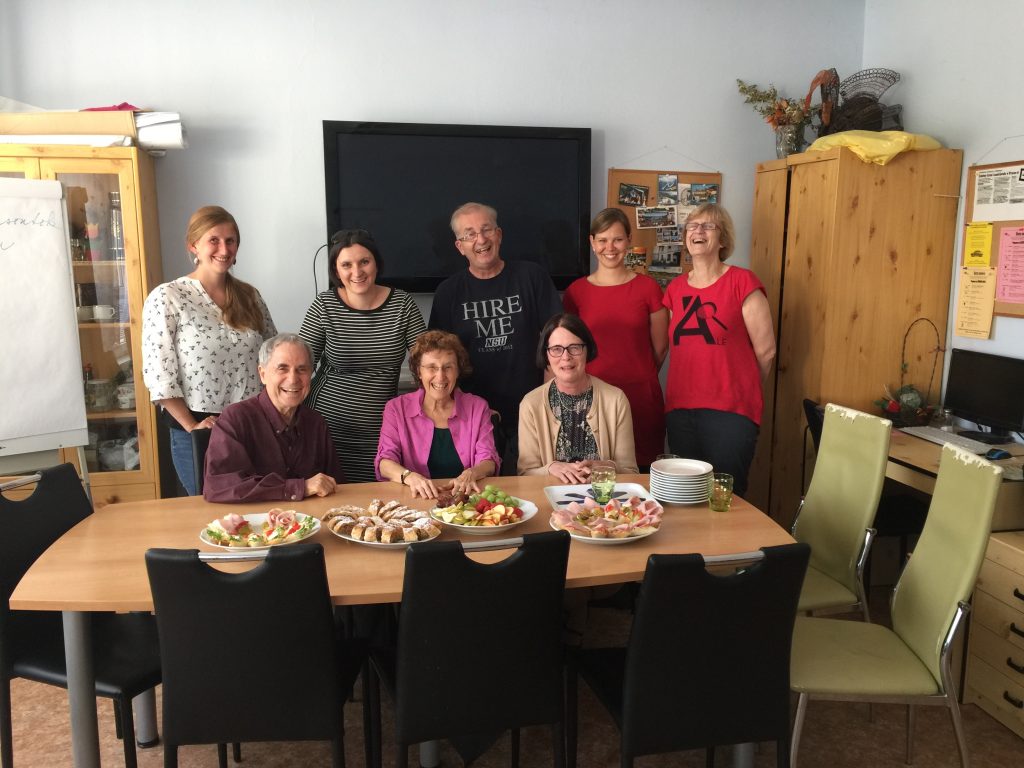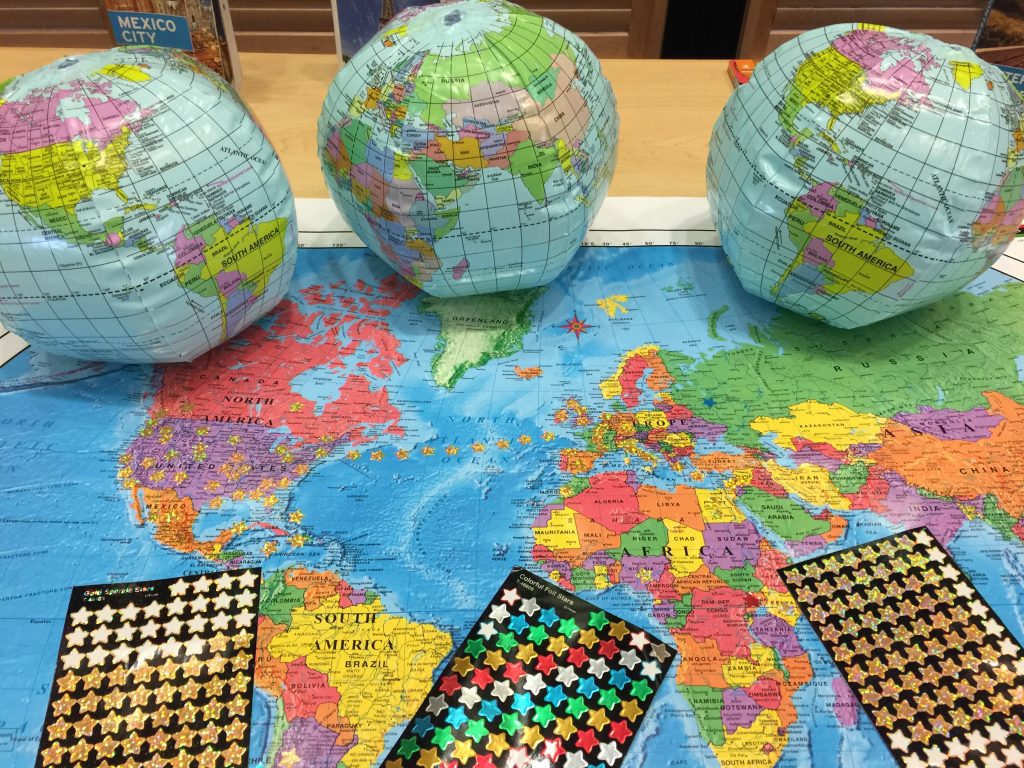Creativity
A Dream Came True at The Red Ballon Movies & Memories
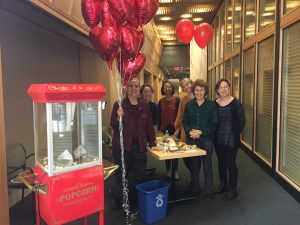 “I wish I had a red balloon,” one of our guests said, after the inspiring ending of the short film, The Red Balloon. Moments later, the dream came true. Each guest was offered a buoyant scarlet balloon, the magical symbol of a meaningful film.
“I wish I had a red balloon,” one of our guests said, after the inspiring ending of the short film, The Red Balloon. Moments later, the dream came true. Each guest was offered a buoyant scarlet balloon, the magical symbol of a meaningful film.
The Movies & Memories program now has a new time and date: the first Wednesday of each month from 10:30-12:00.
As guests enter the lower level of the 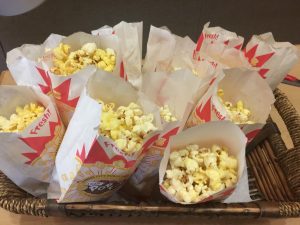 Plaza Library, they breathe in the enticing aroma of fresh popcorn. Soon, they are settled in comfortable chairs and munching on popcorn and cookies, while being serenaded. They sing along with Richelle Basgall, who engages them with fiddle, guitar, kazoo, and more. They tap their feet and clap their hands, belting out favorite folk songs and old standards, such as Ol’ Suzanna, Que Sera Sera, and I’ve Been Working on the Railroad.
Plaza Library, they breathe in the enticing aroma of fresh popcorn. Soon, they are settled in comfortable chairs and munching on popcorn and cookies, while being serenaded. They sing along with Richelle Basgall, who engages them with fiddle, guitar, kazoo, and more. They tap their feet and clap their hands, belting out favorite folk songs and old standards, such as Ol’ Suzanna, Que Sera Sera, and I’ve Been Working on the Railroad.
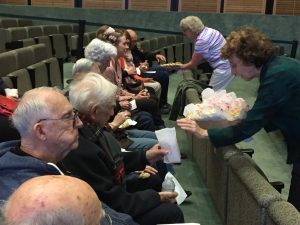 Then the lights lower and everyone watches intently as a young boy and his red balloon form a deep bond, and stick together, despite many obstacles. People were still talking about the movie as they and their balloons trail down the hallway, heading towards home.
Then the lights lower and everyone watches intently as a young boy and his red balloon form a deep bond, and stick together, despite many obstacles. People were still talking about the movie as they and their balloons trail down the hallway, heading towards home.
Get a taste of The Red Balloon movie event by clicking here.
Many thanks to our wonderful volunteers, including Sharon, Julie, and Pam. And special thanks to Sharon and Elizabeth from Stonecrest for bringing delicious snacks for us.
Our next movie experience is on July 3rd. Please join us for Room on the Broom, and other short films, a celebration of diversity. You’ll love the songs from Robert Gibby Brand, our featured musician.
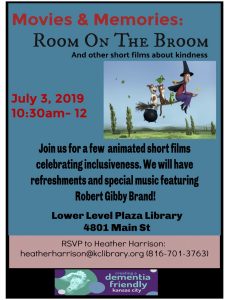
Click to view informative and inspiring short videos on our YouTube channel
Deborah Shouse is the author of Connecting in the Land of Dementia: Creative Activities to Explore Together and Love in the Land of Dementia: Finding Hope in the Caregiver’s Journey.
Talking about Dementia with Teens
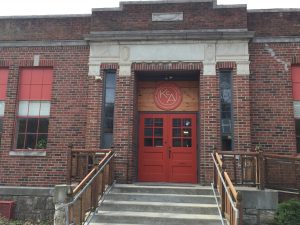 We were delighted to spend time with the bright and curious sixth and seventh graders in Mary Silwance’s class at KC Academy. They had read the young adult novel Hour of the Bees, which features a poignant relationship between a pre-teen girl and her grandfather who is living with dementia, and they wanted to learn more. During our short time together, talking about dementia with teens, we discussed:
We were delighted to spend time with the bright and curious sixth and seventh graders in Mary Silwance’s class at KC Academy. They had read the young adult novel Hour of the Bees, which features a poignant relationship between a pre-teen girl and her grandfather who is living with dementia, and they wanted to learn more. During our short time together, talking about dementia with teens, we discussed:
- How it might feel for people who are living with dementia
- Stigma and stereotypes
- Creativity and dementia
- Becoming an advocate
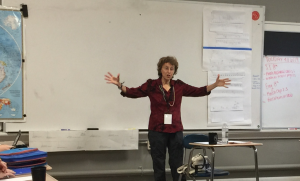 Here are a few excerpts from our lively conversation:
Here are a few excerpts from our lively conversation:
How many of you have ever misplaced something? How did you feel when you couldn’t find it?
How many of you have ever forgotten what you were going to say?
Have any of you ever overslept, woken up in a panic, and not known what day it was?
Those kinds of issues happen to most of us, at least occasionally.
But imagine how you would feel if they started happening all the time. You kept misplacing your cell phone, your homework, your library books. You couldn’t remember your address or your teacher’s name. What if you raised your hand to answer a question at school and the words you were going to say just disappeared. Or they came out all jumbled up? What if it happened so often that you started to worry about talking and became more and more quiet?
These are a few of the things that people who are living with dementia have to cope with.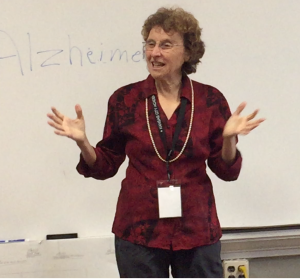
With most illnesses, people cluster around and want to help you. But some people with memory loss actually lose their friends. We know dementia is not contagious, so why would people shy away?
People are scared when their friends and family members start changing. They’re worried they won’t know what to say or how to communicate. They’re worried about making a mistake. But the only mistake is abandoning a person you care about.
Lots of people are working together to make life better for those who are living with dementia. And some are those are people who are living with dementia. They say, “Nothing about us without us,” which means, “Don’t make plans about our lives without consulting us.”
How you can be an advocate
- Watch your language. Don’t use the words victim or sufferer with Alzheimer’s or dementia. These are strong and courageous people dealing with a brain disease.
- Look for opportunities to spend time with people who are living with dementia.
- Don’t worry if you don’t know what to say. Look at the person. If they’re in a wheelchair or chair, bend or kneel so you can have eye contact.
- Try to find a quiet place to talk and listen. Some people are overwhelmed by too much noise.
- Remember to slow down because some people need extra time to answer questions.
- Seek ways to connect through arts and imagination, including music, drawing, cooking, gardening, and flower arranging.
Click here to experience part of the conversation
Click to view informative and inspiring short videos on our YouTube channel
Deborah Shouse is the author of Connecting in the Land of Dementia: Creative Activities to Explore Together and Love in the Land of Dementia: Finding Hope in the Caregiver’s Journey.
Free events for people living with dementia and their care partners
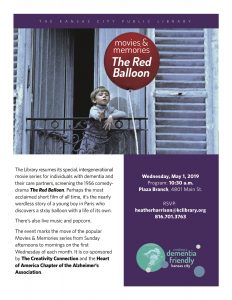
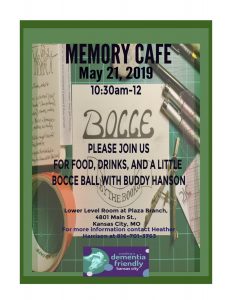
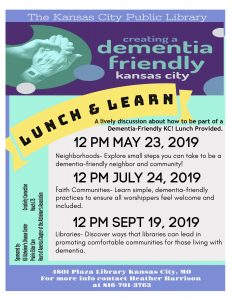
Rock Around the Library: Celebrating a Year of KC Memory Cafes
No one can sit still. Not when Little Richard, The Archies, or Dion are singing. It’s a Rock Around the Library: Celebrating a Year of the KC Memory Cafes. We are one-year-old this March and we’re celebrating with Musical Bingo by Carrieoke Productions. We’ve enjoyed ice cream and cake and we’re ready to roll, rock and roll, that is.
At the first note, one of our guest says, “Sugar, Sugar.” She’s right and a small group of us sings the literally saccharine 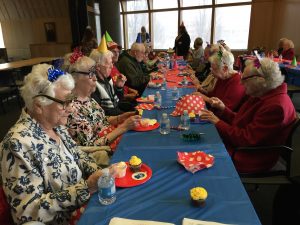 lyrics, “Sugar, ahh honey, honey, you are my candy girl…”
lyrics, “Sugar, ahh honey, honey, you are my candy girl…”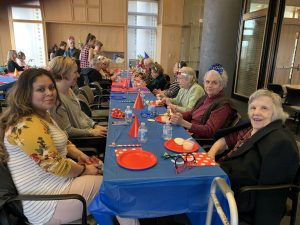
Within moments, all the care partners are dancing. We’re all helping each other find the songs on our Bingo sheets. We’re singing along when we know the lyrics and humming along when we don’t. We’re laughing.
When Carrie plays the Beach Boys’ tune, I Get Around, one guest says, “I wish I could get around.” Another chimes in, “Me too!”
For an hour, we Twist and Shout, warble Do You Want to Dance?, warn our neighbors not to “step on my Blue Suede Shoes,” and shake our heads over Run Around Sue. Those who win at musical bingo, and there are many of them, get to select a prize. 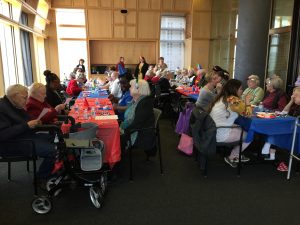
“It’s wonderful to see people blooming,” one care professional says.
And it’s equally wonderful to see the caregivers laughing, joking, dancing, encouraging, sharing, and helping us create This Magic Moment.
Click here to join the party:
Don’t miss our Magic Moment in April. The Kansas City Zoo is bringing some exotic and personable animals on April 16th.
Please join us at 10:30 on the lower level of the Plaza Library. Come early. Please share this information with anyone who might benefit.
Deborah Shouse is the author of Connecting in the Land of Dementia: Creative Activities to Explore Together and Love in the Land of Dementia: Finding Hope in the Caregiver’s Journey.
Quality Moments in the Land of Dementia: Laughing and Creativity in Jamaica
Our hosts started the program with a beautiful hymn of gratitude, a perfect way to acknowledge the spiritual aspects of connecting and laughing in the land of dementia. We met in the Salvation Army Church and Community Centre in historic downtown Falmouth, Jamaica, with a group of caregivers and community advocates. During our time together, we shared stories, information, laughter exercises, and creative ideas for taking care of ourselves and staying engaged.
 For many, this was an introduction to dementia. For others, who were in the midst of caregiving, this was a time of learning and sharing.
For many, this was an introduction to dementia. For others, who were in the midst of caregiving, this was a time of learning and sharing.
Ron and I talked about the importance of accepting each other as we are, no matter what we are going through. We discussed the power of having a purpose and how vital it is for all of us to have meaningful relationships and interesting experiences. .
”When communicating with people who are living with dementia, don’t argue,” Shirley Duncan reminded everyone. “Don’t criticize. Be there to support and appreciate.”
“When we are kind to ourselves, then we are better able to be kind to others,” one of our attendees said.
We discussed Dr. Cameron Camp’s concept of cognitive ramps, offering people the assistance they need 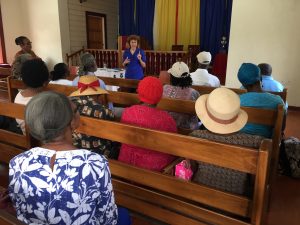 to remain engaged in the activities they love. Here’s one example from our session: Lorna’s mother was a professional cook, completely at home in the kitchen. As her dementia progressed, she could no longer remember the family’s favorite recipes. But she could sit in the kitchen and enjoy the energy of cooking. And when Lorna’s daughter said, “We are going to make your famous stew. Does it have an onion in it?” the mother smiled and nodded. Ingredient by ingredient, they consulted her, and she smiled and nodded at the mention of the right ingredients. Even though she wasn’t physically creating the meal, she was an integral part of the process.
to remain engaged in the activities they love. Here’s one example from our session: Lorna’s mother was a professional cook, completely at home in the kitchen. As her dementia progressed, she could no longer remember the family’s favorite recipes. But she could sit in the kitchen and enjoy the energy of cooking. And when Lorna’s daughter said, “We are going to make your famous stew. Does it have an onion in it?” the mother smiled and nodded. Ingredient by ingredient, they consulted her, and she smiled and nodded at the mention of the right ingredients. Even though she wasn’t physically creating the meal, she was an integral part of the process.
We talked about the power of music, sharing ideas from Dan Cohen’s Music and Memory program and introduced people to the personal playlist. We had an impromptu Conductorcise session, using Maestro David Dworkin’s aerobic and ground-breaking program, pretending we were conducting a symphony orchestra. We used laughter syllables to make it even more fun and soon everyone was standing up and conducting and laughing.
We shared a story from Karen Stobbe, reminding us all to affirm and appreciate and to use the improv technique, “Yes and…” to ignite and invite conversation.
Throughout our discussion, we wove in laughter exercises.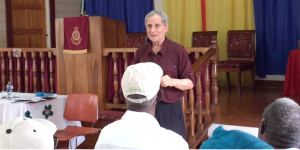
We enjoyed an imaginary laughter swim. We batted around laughter balloons and cooked up a laughter stew that included fish, pumpkin, garlic, carrots, Irish potatoes and okra.
At the end, we breathed in our gratitudes, closed our eyes and sent our feelings of love, connection, and laughter into the world, hopefully to help and inspire others.
Click here for a small taste of this lively workshop:
A special thanks for the dementia advocates and community volunteers who brought everything together, including Dundeen Ferguson, Shirley Duncan, Sandra Latibeaudiere, Elise Thomas, and Lorna Colley. And thanks to everyone who attended.
Deborah Shouse is the author of Connecting in the Land of Dementia: Creative Activities to Explore Together and Love in the Land of Dementia: Finding Hope in the Caregiver’s Journey.
Laughing for Health and Happiness in St. Thomas
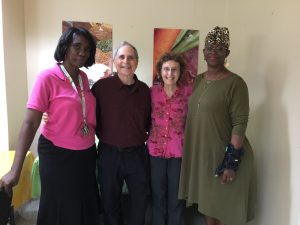 The people of St. Thomas have been through a lot and many are still recovering from Hurricane Maria. But despite the hardships, they were ready to laugh for health and happiness. We were delighted to be working with our friend Arleen Evans O’Reilly, Director of the Family Caregiver Support Program, offering a laughter yoga class in St. Thomas. We met at the senior center and had a wonderful time facilitating laughter with seniors, caregivers, and people who are living with dementia. CLICK HERE to experience a glimpse of our session.
The people of St. Thomas have been through a lot and many are still recovering from Hurricane Maria. But despite the hardships, they were ready to laugh for health and happiness. We were delighted to be working with our friend Arleen Evans O’Reilly, Director of the Family Caregiver Support Program, offering a laughter yoga class in St. Thomas. We met at the senior center and had a wonderful time facilitating laughter with seniors, caregivers, and people who are living with dementia. CLICK HERE to experience a glimpse of our session.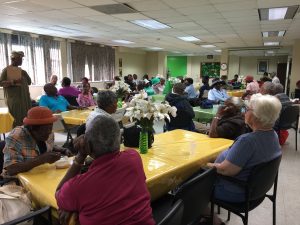
We have been experimenting with making our laughter sessions increasingly interactive. We invited our attendees to suggest ingredients for the stew and it included chicken, pumpkin, onions, carrots, potatoes, and bullion. After we added and stirred, we tasted and it was both delicious and “funny” tasting.
For our milkshake, we first asked people what ice cream they want to use. We had a lot of chocolate lovers. A few enjoyed vanilla and strawberry. We also had fans of praline cream, banana, and cherry Garcia. We held an imaginary container in one hand and we poured milk with the other hand and and said, “Ha ha ha.” After doing that three times, we scooped in our ice cream three times, adding in laughter syllables. Then, with both hands, we shook and laughed. Finally, we tasted and enjoyed a good giggle.
Ron and I continue to explore ways to add more laughter into our every day lives. The benefits of sustained intentional laughter include reducing stress, lowering blood pressure, boosting the immune system, increasing oxygen to the brain, creating a sense of connection and community, and increasing feelings of happiness. Plus, laughter offers us aerobic exercise.
Here are some of the way we’re adding extra laughter into the day:
- Laughing while we exercise. Squats are much more fun when you’re giggling as you do them.
- Adding laughter activities in while we walk.
- Singing “Ha Ha” syllables to favorite tunes. Even a simple, Row Row Row Your Boat, with Ha ha syllables, makes us laugh.
- Looking at the clock and deciding, “We’re going to laugh for one minute.”
We often visit Robert Rivest’s site for short ten-minute laughter videos, which cheer us onward. Laughteryoga.org offers more great resources. And we have fun creating our own laughter activities. If you have laughing ideas you want to share, we’d love to hear from you.
Deborah Shouse is the author of Connecting in the Land of Dementia: Creative Activities to Explore Together and Love in the Land of Dementia: Finding Hope in the Caregiver’s Journey.
Santa Takes a Stand
I saw the red outfit and overgrown white beard even before I heard the bell ringing. I reached into my pocket to dig out a few coins. This Sunday Santa looked surprisingly like a Norman Rockwell version. Then I noticed there was a glint rather than a twinkle in his blue eyes.
“I’m asking you to give back,” the man in red said:
“Excuse me?”
“I’m asking you to give back!” His voice was deep, but I didn’t hear the old jolliness.
He handed me a piece of paper with the heading: Capital Campaign, The Season for Giving, S. Claus and Associates. “Have you received good service from our outfit over the years?”
“Well, yes, I have,” I said, remembering the red bicycle that had magically appeared when I was seven.
“And do you feel like we have met and exceeded your expectations?”
“Yes, I do.” I rubbed my hands together. The wind was sharp and my fingers felt frozen.
“I really need to get going,” I said.
Santa touched my arm. “We need your help. How would you feel if you’d been working night and day for others, trying to make wishes and dreams come true, creating astonishing presents and delivering them. How would you feel if all you ever received back was the occasional cookie and milk. I have had enough. I am asking you to give back.”
I looked at Santa carefully and wondered if whoever hired him knew he was over the edge. I breathed in, but detected no odor of alcohol. His pupils were not dilated; his hands not frenetic. He didn’t look like he was on some mind-altering substance.
I reached into my wallet for a dollar or two.
“No,” he said, pushing away the money. “I want you to truly give. Not just a spare couple of bucks. I want you to understand and appreciate what I’m doing.”
Part of my brain was sternly reminding me this was an ordinary man dressed in a fluffy red suit. Then, a wave of compassion pushed through me. Here was a great mythological hero asking for help!
Santa’s legs seemed to buckle and he sagged as though he were about to fall. I took his arm and led him into a nearby fast food place, where I bought him coffee and fries and a big burger with everything. As he ate, I pulled out my cell phone.
“I’m going to be a few minutes late,” I told my shop manager.
“That’s just one of the things we need,” Santa said mournfully, as I finished my call.
“What?”
“Cell phones. Can you imagine dropping down all those chimneys without calling ahead first and making sure there’s no chestnuts roasting?”
I pictured Santa, sitting in his reindeer-driven sleigh, dialing direct and collect. I wondered how many would take the call.
“Santa, people expect to receive from you. That’s what we love about you. All we have to do is act reasonable for a year, and we get wonderful gifts.”
“Things change,” Santa said. “We’ve existed for years on nothing but goodwill and good cheer. But the supply is running low. I’m thinking we should forget the old fashioned approach and embrace the age of technology.”
My throat tightened. I imagined Santa, logging in on line, charging up presents on his gold credit card, filling out W-2’s on the elves and writing up reports for OSHA and the SPCA about the reindeer. I imagined a virtual holiday, where presents simply appeared as part of an email attachment, recipients unspecified.
“What can I do?” I asked. “Do you have a list of what you want? We always give you a list to work from.”
“I hadn’t thought of that! Of course! Can I borrow a crayon and paper?”
I handed Santa a pen and a page from my note pad. As he wrote, I stared out the window, watching shoppers rush past. Most of them looked anxious and overwhelmed. They would be even more anxious if they knew Santa was considering taking a Christmas off!
Santa smiled as he handed back my pen and said,
“Now, I want to sit in your lap and read you my list.”
“What!”
Before I could refuse, Santa had settled at least half of himself on my lap.
“So what would you like for Christmas?” I said, in my deepest, merriest voice.
- “A cell phone, with unlimited long distance.
- A new transportation system. Something that doesn’t leave hoof prints.
- Productivity training for the elves.
- Sensitivity training for the reindeer.
- A new suit, something with pockets.
- A new corporate headquarters — in a more temperate climate.
Santa bounced up and down as he recited his list. Each bounce made my legs twinge. Each word made my heart cringe. If Santa traded his charm, and his bumbling good will for high tech efficiency, the whole spirit of the holiday season would be radically changed.
“Now what?” I asked, when Santa had finished his list..
“Now that you’ve paid some attention to me, I feel better.” Santa stood up. He fluffed his beard, brushed a few crumbs off his belly, and said, “Ho Ho, I feel richer already. Please spread the word about giving back.”
I raced to work, feeling great. I had just given to one of the world’s champion givers. As I walked down the crowded street, I looked carefully at each rushing person, wondering who else was in need of a little good cheer.
Deborah Shouse is the author of Connecting in the Land of Dementia: Creative Activities to Explore Together and Love in the Land of Dementia: Finding Hope in the Caregiver’s Journey.
Dementia Arts to Draw us Together
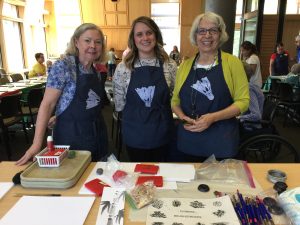 September’s Memory Cafe featured a lively team of educators from the Nelson-Atkins Museum of Art. Using the arts to draw us together, they showed us the Chinese art form of painting pictures of bamboo. About fifty of us gathered in the the library’s spacious lower level. Colorful plastic cloths covered our tables, making it easy to distinguish our drawing paper and painting supplies.
September’s Memory Cafe featured a lively team of educators from the Nelson-Atkins Museum of Art. Using the arts to draw us together, they showed us the Chinese art form of painting pictures of bamboo. About fifty of us gathered in the the library’s spacious lower level. Colorful plastic cloths covered our tables, making it easy to distinguish our drawing paper and painting supplies. 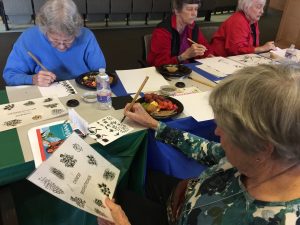 All of us eagerly dipped our special bamboo brushes into the ebony paint and made short pushing movements, replicating segments of the plant’s stalk. Then our educators showed us drawings of bamboo foliage and we experimented with wispy thin lines of leaves.
All of us eagerly dipped our special bamboo brushes into the ebony paint and made short pushing movements, replicating segments of the plant’s stalk. Then our educators showed us drawings of bamboo foliage and we experimented with wispy thin lines of leaves.
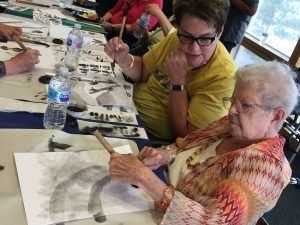 Our common ground continued as our teacher said, “Now, we’re going to pass out large sheets of paper.” We all oohed and aahed and let our strokes grow larger and more confident. At the end, each person created a design in a small wedge of clay, pressed the clay into a red stamp pad, and adorned the painting with our own personal “signature.”
Our common ground continued as our teacher said, “Now, we’re going to pass out large sheets of paper.” We all oohed and aahed and let our strokes grow larger and more confident. At the end, each person created a design in a small wedge of clay, pressed the clay into a red stamp pad, and adorned the painting with our own personal “signature.”• To add extra meaning, connect the artistic activity with something in your partner’s past.
• Invite an intergenerational mixture of artists, from children, grandchildren, art students, and volunteers to join your partner and add encouragement. 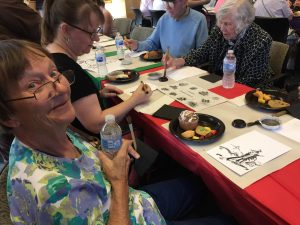
• Create a variety of art-related activities, including visiting galleries or looking at pictures from magazines, as well as painting, drawing or various media.
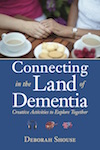
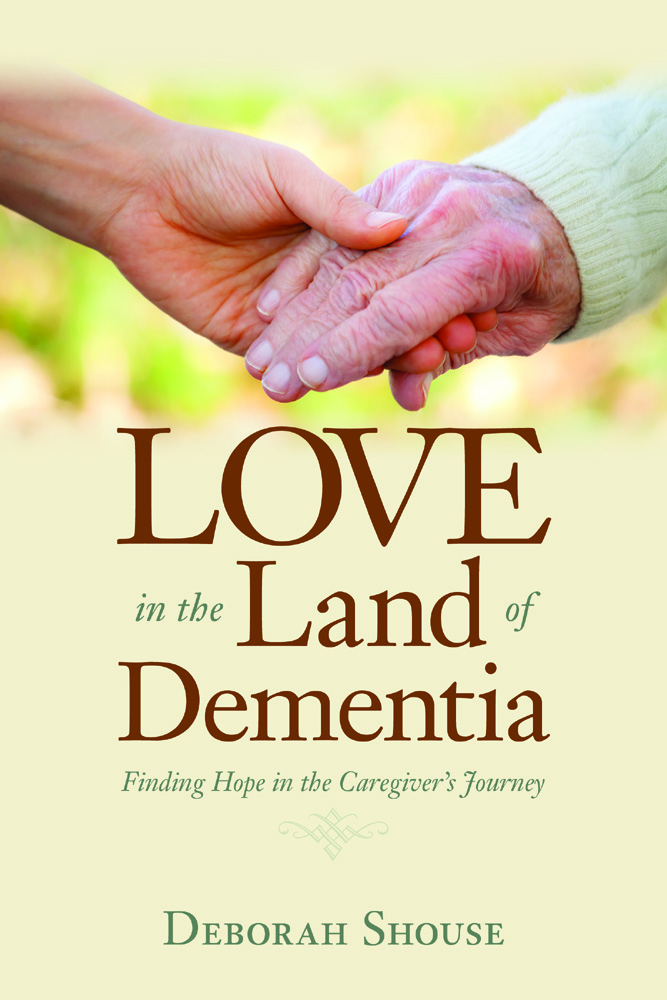
Czech Mates in Dementia Care: Laughter Yoga in Prague
The table was spread with an array of Czech delicacies: apple strudel, special sandwiches with flowers of ham atop fresh baguettes, a bountiful tray of strawberries, grapes, and apple slices. 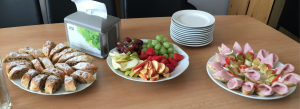
“This is the way we welcome people here in Prague,” said Lucie Hajkova, social worker and coordinator of respite care for the Czech Alzheimer’s Society.
Ron and I were visiting the Gerontological Centre and the Czech Alzheimer’s Society, which are both housed in the same building. The two organizations work together to offer clients everything they need, from psychological counseling, to memory testing, to social work services, to healthcare. We came to learn and to present a laughter yoga session.
We gathered with staff members around the table to learn about the center, which was started in 1997 by Iva 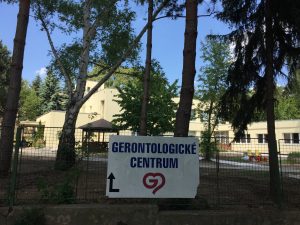 Holmerova, MD. along with Hana Janeckova, PhD. Hana was putting together training materials for caregivers when she was contacted by Alzheimer’s Disease International. They wanted to know more about her work and they invited her to an international conference in Jerusalem. That conference was a turning point. Hana left it inspired and determined to help Czech families that were dealing with dementia. She contacted Iva and both saw the need to offer education, diagnosis, support, and care for people living with dementia and their families in the Czech Republic. Today, both centers are flourishing.
Holmerova, MD. along with Hana Janeckova, PhD. Hana was putting together training materials for caregivers when she was contacted by Alzheimer’s Disease International. They wanted to know more about her work and they invited her to an international conference in Jerusalem. That conference was a turning point. Hana left it inspired and determined to help Czech families that were dealing with dementia. She contacted Iva and both saw the need to offer education, diagnosis, support, and care for people living with dementia and their families in the Czech Republic. Today, both centers are flourishing.
We were impressed with the dementia services they offered, which included home care for people who need help with bathing, dressing, eating, exercise or more. The building holds a respite center. When families need renewal time, or when people living with dementia need extra care or healing time, they can stay in respite for up to a month. The Centre also hosts a day program that offers a variety of activities in a homey and comfortable setting,
Even more impressive than the Society’s services were its staff. Each had a passion for this work, a love for those who are living with dementia, and a compassion for their families.
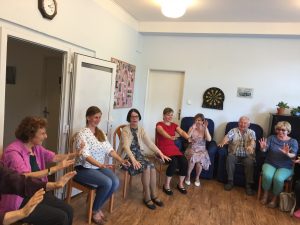
We had a wonderful time sharing a laughing session at the day center—our first international facilitation. We sat in a beautiful circle of people living with dementia, staff, family, and friends. We couldn’t have done it without our translator, Eliska, who captured the energy and essence of what we were saying. And once we all started laughing, we were beyond the constraints of language. Click here to experience a bit of laughter in Prague.
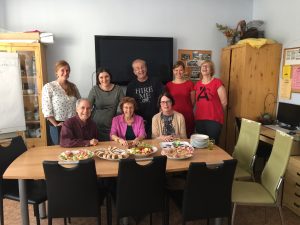
Photo Caption:
Eliska Brouckova, psychologist, consultant/advisor for people with dementia and their care givers
Martina Matlova, Director
Petr Veleta, PhD, dancer, dance therapist
Marketa Splichalova, psychologist, consultant/advisor for people with dementia and their care givers
Eva Jarolimova, PhD, psychologist, consultant for people with dementia and their care givers
Hana Janeckova, PhD, co- founder of the Czech Alzheimer Society, head of governing board of Czech Alzheimer Society, University teacher, researcher
Lucie Hajkova, social worker, coordinator of respite care in homes of people with dementia.


Movies and Memories: Traveling the World Without Leaving Kansas City:
“I’ve traveled the world. Our family moved a lot when we were young,” one of our guests told us, at our August Movies and Memories program. She and her husband bent over our world map and stuck stars on some of the many places 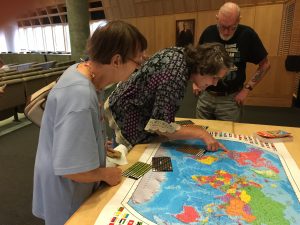 they’d lived. Another guest sighed when he looked at the map and saw Vietnam. He had served in the military there. A couple talked about living in Berlin when the Wall came down.
they’d lived. Another guest sighed when he looked at the map and saw Vietnam. He had served in the military there. A couple talked about living in Berlin when the Wall came down.
Our Movies and Memories travel films included forays into Paris, Iceland, Capetown, and Seoul.
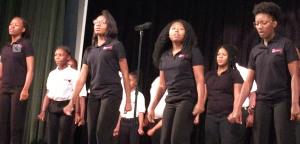 “It was relaxing just watching the scenes from Paris,” said Ah’Lee Robinson, director of the Kansas City Boys and Girls Choirs. He and his singers treated us to an inspiring concert, warming us up for the films.
“It was relaxing just watching the scenes from Paris,” said Ah’Lee Robinson, director of the Kansas City Boys and Girls Choirs. He and his singers treated us to an inspiring concert, warming us up for the films.
“Oh dear, now I want to go to Iceland,” another guest said.
In between clips, we passed around exotic spices for everyone to smell. At the end of the movies and memories adventure, everyone took home a special “Passport” booklet, created by the library’s Emily Cox, so they could record impressions and memories. To experience the event, click here.
Here are some passport questions to discuss at home: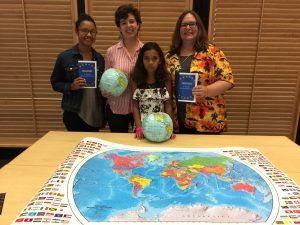
Share some travel memories.
What is one of the most beautiful places you’ve ever visited?
What’s the farthest you’ve ever traveled?
What country has the best food?
How many of the US states have you visited?
Thanks to our wonderful volunteers, Sharon and Julie, who brighten our events by bringing treats, making popcorn, and making everyone feel so at home.
Thanks to Craig Eichelman, State Director, AARP, for helping us spread the word about this program.
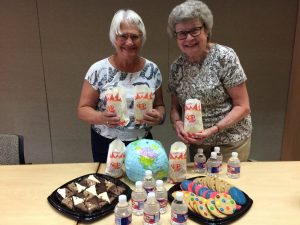 We are so grateful for the continuing support from the Kansas City Public Library. They are amazing champions for people who are living with dementia and their care partners. They also provide scholarships for hard-working people whose higher education has been interrupted by life circumstances. Their community programs benefit early readers, job seekers, and people who are new to KC. Ron and I use their books and other services every week!
We are so grateful for the continuing support from the Kansas City Public Library. They are amazing champions for people who are living with dementia and their care partners. They also provide scholarships for hard-working people whose higher education has been interrupted by life circumstances. Their community programs benefit early readers, job seekers, and people who are new to KC. Ron and I use their books and other services every week!
Please join us for our next adventure — Moana. This movie is so inspiring and great for all ages.
